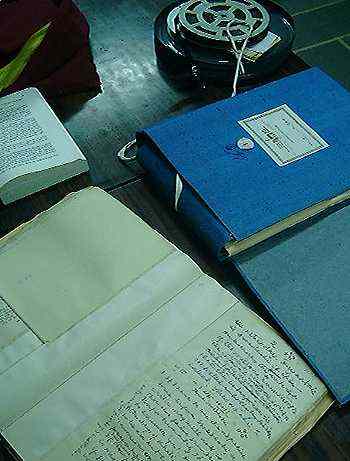|
Following
Gandhi's Path - Part 6
Gandhi's
Ashram by the
Sabarmati River
By Jan
Oberg
TFF director
"It is good that
Gandhi was shot..." - Hindutva
The bus ride from Bombay to Ahmedabad, also called "
India's Manchester", takes 17 hours. My neighbour for the
trip is a businessman who deals in gold and famous
Hyderabad pearls. That is to say the pearls originally
came from Basra, Iraq, but with Saddam and everything
happening there, they are now said to come from
China.
"India's latest budget is really good for us business
people, but otherwise politicians have just managed to
ruin this country. Corruption and shit everywhere. Just
look at the streets, this bus, or the schools".
The young energetic capitalist goes on:
"You know, what we need is a revolution! You can't
keep a country together where everyone only thinks about
themselves. We can't be independent unless we start
acting like a community. We are also far too many. The
Chinese left us behind long ago".

Photo Jan Öberg, © TFF
2001
The mosque of Ahmedabad
When he hears that I'm interested in Gandhi, he
says:
"He was for peaceful coexistence, which is really
great! But the Muslims wanted to have a country of their
own, Pakistan, and ought to have moved to that country,
all of them! Here they refer to their religion, Islam,
and argue that it's all right to have four wives, but
when a Muslim criminal is about to get his hand chopped
off, they immediately invoke Indian law. If I may say so,
I think it was good that Gandhi was shot…".
With the rapid spreading of Hindutva, the new Hindu
fundamentalism, such ideas are getting more and more
popular. India is the biggest Muslim country in the
world. Evacuation of a little over 110 million people
would really deserve the epithet of 'ethnic cleansing'.
I wake up to a grey and misty morning when the bus
arrives in Ahmedabad, capital of the state of Gujarat.
Luckily, I can't see much of the earthquake now.
Ahmedabad -
Vidyapith
In 1920, Gandhi founded Gujarat Vidyapith here, one of
the two big universities of the town. I visit the small
idealistic troop at the peace institute, where some of
the best research on Gandhi has been done -partly by
Navajivan Publishers just around the corner. It is the
Navajivan Trust that owns the copyright to Gandhi's
complete works (100 volumes!). They have published the
now classic biographies as well as hundreds of minor
publications.

Photo Jan Öberg, © TFF
2001
The peace research institute of
Gujarat Vidyapith, founded by Gandhi
So here was where they had printed most of my Gandhi
library's dusty, mildew-smelling books, I thought.
Gandhi was born in Porbandar in Gujarat and Gujarati
was his main language. Ahmedabad is a dynamic, industrial
town, where Gandhi acted as a mediator in a very
complicated conflict between striking textile workers and
capitalists, with whom he was on friendly terms - a
thrilling story described in the psycho-analyst Erik H.
Eriksson's classic, Gandhi's Truth. On the Origins of
Militant Non-violence (1969).
It was also from here that Gandhi, together with some
seventy "satyagrahi" - truth warriors - started one of
the most remarkable political demonstrations of our time,
the Salt March.
Sabarmati
Gandhi's "Sabarmati"-ashram is beautifully located
near the river Sabarmati. A range of low, white cottages
are situated near the prayer meeting-place, with Gandhi's
own "kurti" (hut) closest to the water. At least, that's
how it was then, before the big river nearly dried up, so
that now there are only a few buffaloes wandering among
the puddles of water many meters below the ashram. Entire
rivers and villages disappear in India as a consequence
of gigantic dam constructions, as is described in
Arundhati Roy's touching narrative, The Cost of
Living (Flamenco, London 1999).

Photo Jan Öberg, © TFF
2001
The Sabarmati Ashram, Ahmedabad

Photo Jan Öberg, ©
TFF 2001
Gandhi's room in the
ashram
The ashram - today a museum - consists of the
buildings in which Gandhi, his wife and the rest of the
large family lived, as well as a larger complex of open
exhibition halls under giant trees that shelter fantastic
bird-life.
Most visitors are probably unaware of the fact that in
the neighbourhood there are several institutions and even
factories being run in the spirit of Gandhi. They
manufacture latrines and equipment for alternative energy
and waste management, very beautiful handmade paper,
khadi fabrics, looms, soap, and many other products.
There is also a school for girls belonging to the Harijan
caste of untouchables. Two thousand people are employed,
but, unfortunately, not all the units can make ends meet.
The ashram raises money, but is not granted any support
from the state.

Photo Jan Öberg, © TFF
2001
Paper production in connection
with the Sabarmati ashram
This is the right place for those of you who are
interested in researching the "Ghandian" archive
material. Sabarmati has namely a library containing
34,000 letters written by Gandhi and thousands of
original photographs from his life. You have to negotiate
in order to come near this, in my opinion, Holy of the
Holies. There is a steel cupboard with double locks full
of old folio-files, where the yellowish letters and
photographs are hidden. Although all of them can also be
seen on microfilm and as copies, I can't help wondering
when this historical treasure will disappear due to the
moist climate.

Photo Jan Öberg, © TFF
2001
Sabarmati's Gandhi
archive

Photo Jan Öberg, © TFF
2001
Gandhi's handwritten letters and
a film roll
With deep respect, I browse through and read the pages
Gandhi filled with his Parker fountain-pen. I would love
to sit here for weeks, at some point...
Translated by Alice
Moncada
Translation edited by Sara E. Ellis
Other
articles about India, "Following Gandhi's Path" and
picture galleries
©
TFF 2002

Tell a friend about this article
Send to:
From:
Message and your name
|